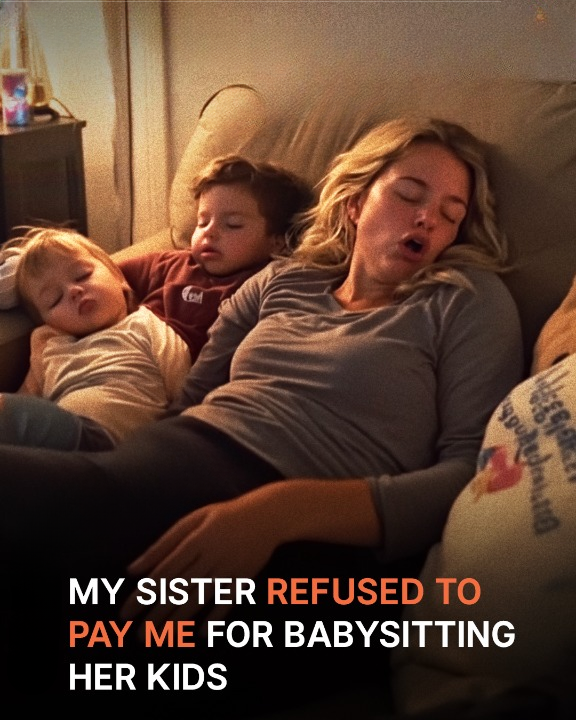
For years, I dropped everything to babysit for free—until I finally drew a line. One honest text shattered the unspoken agreement, and suddenly my sister was furious, my mom got involved, and Sunday dinner became a battlefield of silence. Was I wrong to say no?
I stared at my phone as its dim glow lit up my hands. Another text from Lauren. The same kind I’d gotten so many times before.
Lauren: “Hey, can you watch the kids this weekend? Just a few hours. You’re a lifesaver!”
That familiar tightness crept into my chest. It was never just a few hours. It meant full weekends, zero notice, and canceling my plans while Lauren and her husband enjoyed their freedom. Meanwhile, I was always the one who never said no.
I glanced at my planner—brunch with friends, laundry, maybe even a quiet hour to myself. If I said yes, I’d lose all of it. If I said no, I’d be the villain.
Still, I typed:
Me: “Hey Lauren. I love the kids, but I need to set a boundary. If you need me to babysit, I’d like to be compensated. Hope you understand.”
My heart pounded as I hit send.
Her reply came fast.
Lauren: “Are you serious? They’re your family. It’s just a favor. I thought you loved being with them.”
I did love them—Bella’s tiny hand in mine, Jake’s laughter during homework, their hugs and trust. But love didn’t erase my exhaustion. Love didn’t give me my weekends back.
The guilt hit hard, like I knew it would. I braced myself.
By Sunday dinner, the air in my parents’ house was cold and thick with tension. No greetings, no warmth. Just clattering pans and silence. Mom was at the stove, angry in every motion. Dad was at the table, pretending to focus on his crossword.
Lauren sat with her arms folded, expression sharp.
“So,” she said, loud and pointed, “you’re charging your family now?”
I set down the salad, choosing my words. “I’m setting boundaries. It’s not personal.”
“Not personal?” she scoffed. “You’re acting like I’m some stranger. They’re your niece and nephew.”
“Family should respect each other’s time,” I said evenly.
Dad finally looked up, disappointment written all over his face. “You always loved watching them. Why the sudden change?”
“It’s not sudden,” I said quietly. “I’ve been doing this for years without asking for anything. I just want some fairness.”
Mom let out a long sigh. “It’s not about fairness, Emma. It’s about love.”
I laughed bitterly. “So if I say no, that means I don’t love them?”
Lauren slammed her hand on the table. “Forget it. I’ll find someone else.”
She stormed out. The silence she left behind was louder than anything she said.
That week, no one called. No messages. The family group chat went quiet the moment I said anything. Mom’s voice on the phone was cold and brief. Even Dad stayed out of it.
At night, I scrolled through old photos—Bella’s gap-toothed smile, Jake’s cake-covered grin. I missed them. But I couldn’t keep losing myself just to prove I loved them.
Eventually, I texted Lauren.
Me: “I don’t want to fight. I just want to be respected. Can we talk?”
She read it. I saw the typing bubble… and then nothing.
A few days later, I heard from a cousin—Lauren had hired the teenage neighbor to babysit. No experience. Just someone she’d rather pay than pay me.
It stung.
That Friday, my phone rang. It was Mom.
“We need to talk. Come over.”
When I arrived, Lauren was already there, arms crossed. My parents sat at the table, serious.
“This family is falling apart over money,” Mom said. “It’s ridiculous.”
“It’s not about money,” I said. “It’s about being treated fairly.”
Lauren’s voice cracked with frustration. “You’re turning this into a transaction.”
“No,” I said. “I’m asking for equality.”
Surprisingly, Dad nodded. “Emma’s right. She deserves the same respect anyone else would.”
Even Lauren paused at that. Her arms dropped. “I didn’t think about it that way.”
“I know,” I said softly.
It wasn’t a full resolution, but it was a start.
A week later, Lauren called. I hesitated—but picked up.
“Hey,” she said, her tone softer. “I thought about what you said. You were right. I got used to you always saying yes.”
“Thanks for saying that,” I replied.
Then, carefully, she added, “Maybe we can work something out? I’ll ask in advance. And I’ll pay you.”
Relief hit me. “That sounds fair.”
She laughed lightly. “And maybe, sometimes, you’ll do it just because you love them?”
I smiled. “Maybe.”
It wasn’t perfect. But it was new ground—built not on guilt, but on mutual respect.
For once, I wasn’t just the dependable babysitter.
I was someone whose time finally mattered, too.